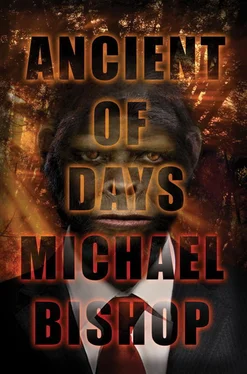LOYD: Adam told Alistair Patrick Blair that you have both a timeless aspect and a temporality that involves you in the time-bound doings of the material world. Is that true? It sounds paradoxical, probably even impossible.
I AM: Like a man who both has a head and doesn’t have a head?
LOYD: Exactly. That was Blair’s precise objection.
I AM: Well, my temporal aspect hardly requires lengthy justification, does it? In that aspect, or one manifestation of it, I am talking to you now. And in one manifestation of that aspect, I possess both a hyena’s head and the mutilated face of the man who killed your godson. And, if you must know, no head at all.
LOYD: All right. Fine. If you’re conversing with me, then you obviously depend on the flow of time to achieve such communication. But how can you simultaneously—ah, but that’s the wrong word, isn’t it—how can you also have a quality of timelessness that places you either outside or above the ongoing mayhem and muck of the physical universe?
I AM: Because you’re a captive of time yourself, Mister Paul, this will be hard to explain. Timelessness is not an attribute you’re well-equipped to understand.
LOYD: Oh, I see. You’re gearing up for a cop-out.
I AM: Not at all. If you can accept Heisenberg’s uncertainty principle in its specific application to quantum theory, confessing that one may know either where a subatomic particle is or how it happens to be moving, but not both attributes at once, why can’t you adopt a like uncertainty principle for a concept as grand and ineffable as that of God? Or, to employ another analogy, if light can be either particle or wave depending on the perspective and the intentions of the observer, why can’t God be a temporal being within the context of creation and a timeless entity in his orientation above, or outside, the universe of matter and mutability? The supposition that he must be one or the other is a reflection of human limitation, which arises not only from finite human understanding but also from your existential immersion in time itself.
LOYD: This isn’t fair. A man who’s spent most of his adult life concocting recipes for cheesecake and pasta dishes should not argue theology with God.
I AM: Who better than you, Mister Paul? A person who has fed publicans and sinners, sociologists and habilines, knows something of what it means to satisfy hunger—as well as to fail in that task.
LOYD: Okay, okay. You’ve mentioned subatomic particles—our ability to know either their location or their motion, but not both. And you’ve mentioned that light can be either a particle or a wave depending on what the observer wishes to find out. But these analogies break down in this situation because atoms and light are temporal phenomena. They have no atemporal attributes at all.
I AM: Congratulations on stating the obvious. Can you think of any phenomena that aren’t finally time-bound or time-determined?
LOYD ( chagrined ): I’m afraid I can’t.
I AM: Then maybe you can see the difficulty of what I want to explain. If you could think of any examples, I’d try to work them into illustrative metaphors for the coincident timelessness and temporality of God. But since you can’t, I’m stuck with phenomena at play within the dimension of time. Thus, everything I tell you is an approximation of something largely inexpressible.
LOYD: Go on. I’ll try to follow.
I AM: Only in my timeless aspect—my supratemporal identity—am I utterly without blemish. There, I AM perfect and fulfilled and all-knowing and, yes, changeless. What I know never alters because it encompasses—until the “end” of “time”—the totality of changes past, present, and future in the physical universe. At my impetus, time—space-time—began on the edge between timelessness and temporality. And one day, in figurative temporal terms, I will put period to time by letting it run the course I’ve already omnisciently calibrated and clocked. Then I will necessarily subsume my temporal avatars and once again simply BE, perhaps from Everlasting to Everlasting. I can’t be more specific than this because my own immersion in the flow of universal time clouds my clairvoyance. Trapped here with you, Mister Paul, I see through a glass darkly—but with a vision, in comparison to your own, pristine and pellucid.
LOYD: Why would a perfect, fulfilled, all-knowing, and changeless deity even bother to inflate the balloon of the physical cosmos? Isn’t that a capricious act? An unnecessary waste of energy?
I AM: I like your metaphor. It has a festive spontaneity totally in accord with the motives of God in my timeless aspect. These motives are complex, innate, and immutable, but they center on the impulse to celebrate my self-awareness with living consciousnesses outside myself. This impulse requires a Creation—the Big Bang that gave birth to space-time and all the galactic populations.
LOYD: How can you describe a God with impulses as “fulfilled”?
I AM: In temporal terms, I can’t. But temporal terms are all we have here. It might be more accurate to say that, even in my timeless aspect, I possess the positive attribute of generosity. In the absence of beneficiaries, however, no one but I could document my possession of this trait. Therefore, I inflated the balloon of the cosmos to affirm the otherwise pointless fact of my generosity. I didn’t need to do so, I wanted to do so. Even this falls short of the reality, Mister Paul, but, here and now, I can scarcely do better.
LOYD: Never mind. What about suffering and death and injustice? How do you square the murder of an innocent child with your hypothetical generosity as the God Beyond Time?
I AM: I don’t. I don’t even try. Every secondary creation of any complexity is flawed. Perfections of various wonderful kinds may occur within it, of course, but the encompassing whole—well, its imperfections are equally numerous. In fact, some of the perfections depend upon them. The just recognize justice by unhappy exposure to its opposite. The wise distill their—
LOYD ( waving his hand in the gelatinous light ): I’ve heard all this before. It’s a recipe for carrion-comfort, dog-god.
I AM: What you must remember is that no matter how terrible the world may seem, no matter how cruel or pointless, the Mind that nudged its ecosystems toward the evolution of self-aware consciousness did so out of an inexpressible generosity.
LOYD: A ponderous vanity, I’d say.
I AM: And the timeless Mind whose temporal avatars intrude upon Creation to shape and direct it in their puny ways—well, that Mind releases them like antibodies into the besieged body of the world. There they help the sentient creatures of faith and goodwill neutralize the poisons of entropy and accident. I came for that reason. So did Buddha, Jesus of Nazareth, and Gandhi, and perhaps the latter-day habiline whom you know as Adam Montaraz. In any case, Mister Paul, Adam came to extend the family of humankind, to demonstrate—via his struggle for personal revelation—the interconnectedness of creation.
LOYD ( flailing at the womb of visible darkness containing him ): I curse you in your impotent timeless aspect! The holy physicians you send us are quacks! Better for us never to have existed than to suffer so grievously from the imperfections built into your misbegotten creation!
I AM: Not at all. Not at all.
( Yagaza, the dog-god, pins Loyd’s hands to his sides. The snout of the upright creature hovers inches from the possessed man’s face. Loyd smells carrion on its breath, the stench of the decaying human features—Craig Puddicombe’s—behind its hyena mask. He seizes the wound in the creature’s chest and averts his face .)
LOYD ( mockingly ): Not at all. Not at all. How does knowing that God possesses a temporal and a timeless aspect improve our lot, Yagaza? What difference—what goddamn difference—does it make?
Читать дальше












